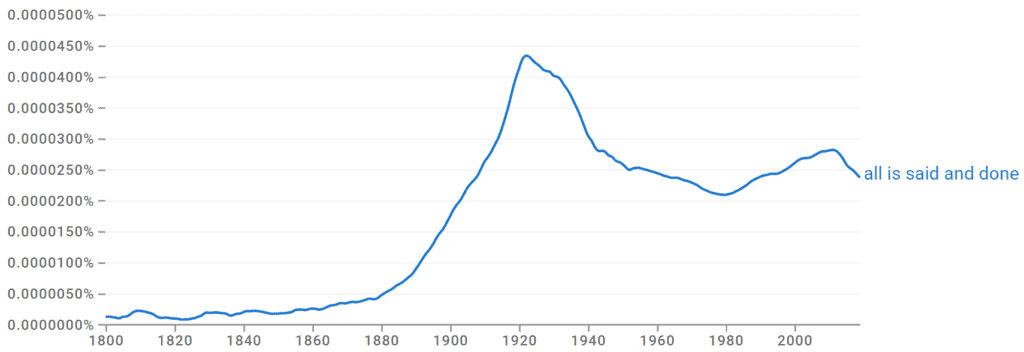Just imagine you’re nearing the end of an intense debate or a long-winded conversation, and someone wraps up your argument with a dramatic, “Well, when all is said and done…” Sound familiar?
This is a very common phrase in the English language, and we use it in a lot of different contexts. So, let’s break down this popular expression and see what it’s all about.
The Great Debate: “All Set and Done” or “All Said and Done”?

First of all, it’s supposed to be all is said and done, not all set and done, but I can see how it would easily get mixed up because both expressions make sense.
But the original phrase is meant to imply the notion of completion or a conclusion being reached after a series of events or a lengthy discussion. So, when you’re summing up an argument, make sure you’ve got your phrasing spot on.
Decoding “When All Is Said and Done”
The common phrase when all is said and done generally suggests a situation’s outcome or conclusion after looking at all the relevant facts or arguments. It comes with a sense of finality, a verdict reached after a thorough stock of all the facts. Here’s a great example of me using this exact phrase last week.
- We’ll look at your grades at the end of the year, and when all is said and done, we’ll see if you deserve that new bike.
Origin and Etymology of the Phrase When All Is Said and Done

The origin of all is said and done is a bit elusive, with a handful of unreliable sources stating where it came from. There’s no root to nail down, but it’s definitely been in use for several centuries.
“When It’s All Said and Done” vs. “After It’s All Said and Done”
Both phrases essentially hold the same meaning, although when it’s all said and done happens to be more common. You can use both to refer to the outcome of something, whether it’s a simple conversation or a complex working system. There’s really no correct or incorrect here, just personal preference.
Synonyms for the Phrase “When All Is Said and Done”
Using other words to express the same idea or meaning adds flavor to your writing. This phrase is fairly wordy, so try something a little shorter.
- In the final analysis
- At the end of the day
- Ultimately
- In the end
- All in all
- In conclusion
- After all
Using “When All Is Said and Done” in a Sentence

- When all is said and done, it’s the company’s profits that matter the most to the investors.
- Christa decided when all was said and done to stay in her hometown after graduation.
- When all is said and done, he was a good man who just made a few bad decisions over the years.
- When all is said and done, I’ll have thirty books published in my name!
- After all is said and done, we’ve decided not to have kids in today’s crazy world.
In the End
With all said and done, you’re now equipped with the knowledge and skills to use this phrase accurately. So, if you ever want to sum up a point, remember it’s when all is said and done and not all set and done, even though both make perfect sense.
Enjoyed reading about this phrase? Check out some others we covered:
